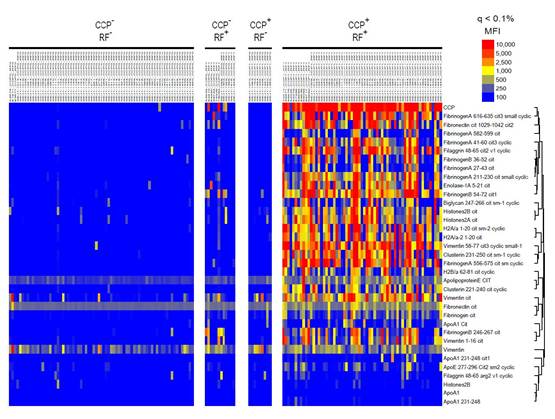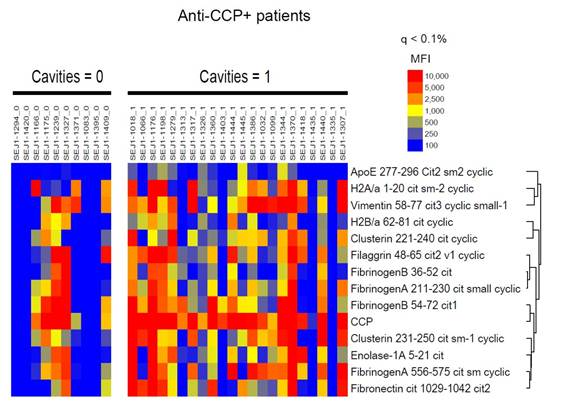Session Information
Session Type: ACR Poster Session C
Session Time: 9:00AM-11:00AM
Background/Purpose: Juvenile idiopathic arthritis (JIA) is
the most common chronic childhood arthropathy. Most children with JIA
phenotypically differ from adults with rheumatoid arthritis (RA) although some children
resemble RA by demonstrating rheumatoid factor (RF) and anti-cyclic citrullinated
peptide antibodies (CCP). Our objective was to characterize the association
between anti-citrullinated protein antibodies (ACPA) and several clinical/epidemiological
features in children with CCP-positive and CCP-negative JIA.
Methods: Cases were 157 children with JIA. (73
CCP-/RF-; 12 CCP-/RF+; 9 CCP+/RF-; 63 CCP+/RF+), mostly female (80%), with a
mean onset age of 8.6 years. Oral health and smoking exposure history were
available on 107 cases. Stored serum/plasma samples were evaluated for reactivity
to 30 citrullinated peptide/protein antigens and 7 native controls using a
multiplex antigen array. Significance analysis of microarrays (SAM) was used to
analyze a multiplex of specific ACPAs among JIA cases to identify differences
in ACPA profiles associated with variables. False-discovery corrected
significance values <5% were considered statistically significant.
Results: All ACPA evaluated were significantly
different between CCP-/RF-, CCP-/RF+, CP+/RF-, and CCP+/RF+ subjects with JIA
(q value <0.1%). Figure 1 is a heatmap demonstrating increased levels of
several antigen-specific ACPAs in seropositive JIA patients. Among CCP+
children, those who reported having no dental caries had significantly less
ACPAs compared to those who reported having dental caries (Figure 2). Several
other variables were also associated with significant differences in ACPA
positivity among children with CCP+ JIA (Table 1).
Conclusion: Children with JIA positive for both
CCP and RF demonstrate significantly increased antibody response to a variety
of citrullinated antigens compared to children who are CCP and RF negative, as
well as those who are positive for either CCP or RF alone. This suggests that CCP
and RF-positive JIA is phenotypically similar to adult seropositive RA.
Presence of dental caries may be associated with increased ACPA subtypes in
children with CCP-positive JIA.
Acknowledgements: NIAMS (AR060893), The Arthritis Foundation, The Marcus Foundation
Inc.
|
Criteria |
Group 1 |
Group 2 |
Number of ACPAs |
Q value |
|
Significant associations with ACPA |
||||
|
Dental caries |
Absent |
Present |
13 |
<0.1% |
|
Regular flossing |
Absent |
Present |
9 |
<0.1% |
|
Pain on chewing |
Absent |
Present |
17 |
<0.1% |
|
Regular brushing |
Absent |
Present |
11 |
<0.1% |
|
Onset age |
<9 |
>9 |
7 |
<0.1 % |
|
Red/swollen gums |
Absent |
Present |
7 |
<0.1 % |
|
Anti P Intermedia |
Lowest ½ |
Highest ½ |
16 |
4.7 % |
|
Not significantly associated with ACPA |
||||
|
Anti P gingivalis |
Lowest ½ |
Highest ½ |
17 |
NS |
|
Anti F Nucleatum |
Lowest ½ |
Highest ½ |
16 |
NS |
|
Smoking exposure |
Absent |
Present |
18 |
NS |
To cite this abstract in AMA style:
Prahalad S, Lahey LJ, Thiele GM, Ponder L, Angeles-Han ST, Lange L, Hersh AO, Rohani-Pichavant M, Jang SR, Vogler LB, Vega-Fernandez P, Rouster-Stevens KA, Bohnsack JF, Mikuls TR, Sokolove J. Characterization of the Serum Anti-Citrullinated Protein Antibody Profile in Juvenile Idiopathic Arthritis: Association with Oral Health [abstract]. Arthritis Rheumatol. 2015; 67 (suppl 10). https://acrabstracts.org/abstract/characterization-of-the-serum-anti-citrullinated-protein-antibody-profile-in-juvenile-idiopathic-arthritis-association-with-oral-health/. Accessed .« Back to 2015 ACR/ARHP Annual Meeting
ACR Meeting Abstracts - https://acrabstracts.org/abstract/characterization-of-the-serum-anti-citrullinated-protein-antibody-profile-in-juvenile-idiopathic-arthritis-association-with-oral-health/


